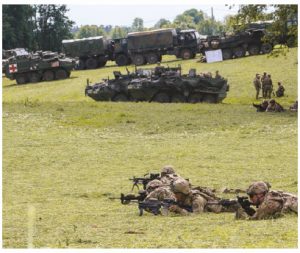
In 1791, the Polish-Lithuanian Commonwealth adopted a modern constitution, making it the first constitutional democracy in Europe and the second in the world, after the United States of America. The constitution was an expression of the liberal political and philosophical ideas of Europe’s Enlightenment, which gave primacy to reason, law and freedom. It adopted Montesquieu’s tripartite division of powers into executive, legislative and judicial. It was, at the time, a groundbreaking model of state governance and constitutional liberty and justice for all, regardless of ethnic background and religious affiliation. The year 2018 is a special one for Poland. We celebrate the 100th anniversary of our country regaining independence after 123 years of bondage. In 1918, a new chapter was opened up in our sometimes very dramatic history, which began more than 1,050 years ago when Poland joined the community of Christian nations. Rebirth of the state was an outstanding achievement of Polish soldiers, politicians and also diplomats. It was made possible because, through our constitution, we preserved our national identity and values such as freedom and equality that we respect to this day. We shall never forget that Canada also played an important role in this story. During the First World War, Canada set up Camp Kościuszko in Niagara-on-the Lake at which Polish soldiers were prepared to fight in Europe for the freedom of Poland. Not only did these soldiers help win Polish independence, they also protected Western civilization by defeating the Bolshevik army at the outskirts of Warsaw. Unfortunately, Poles could not cherish their freedom for very long. Soon the Second World War erupted and the country once again lost its sovereignty. To survive and prosper in our corner of Europe, a nation has to be determined. Our geographical location poses many difficulties, but it also offers unique opportunities to strengthen Poland’s international position. Poland’s foreign policy challenges The fundamental premise of Polish foreign policy is political realism. Poland recognizes all too well that, in this second decade of the 21st Century, the world has once again become less stable and less predictable. Not since the Second World War has the European political landscape seen such a level of open hostilities, aggression against sovereign neighbours and violation of territorial integrity. There are various reasons for this. One of them is certainly Russia’s effort to change the paradigm of international relations and go back to the 19th-Century model of the concert of great powers. It transpires through an aggressive drive for domination over ex-Soviet territories as well as through a deliberate policy aimed at destabilizing the eastern and southern neighbourhoods of the European Union. Moreover, Moscow is making a deliberate attempt to weaken the EU and its individual member states. Moscow considers the EU and NATO its strategic rivals. The broad principles of democratic nations should serve as the bedrock for modern-day relations between states. In their basic form, such principles are enumerated in the founding documents of the United Nations’, the Organization for Security and Co-operation in Europe and the European Union. As a member of these organizations and a signatory to all of their most important documents, Poland is active on this front. Military strength has to complement the rule-based international order and is a vital tool for pursuing Polish foreign policy goals. In parallel with developing its own military potential, Poland continues to reinforce the Allied military presence along NATO’s eastern borders. The measures include political and diplomatic steps to fully implement decisions taken at the Newport and Warsaw summits, an example of which is establishing battle groups in NATO’s eastern flank. Poland maintains the size and structure of its military budget in line with Allied commitments. The sustainable growth of the European defence industry should lead to a qualitative improvement in the defence capabilities of EU countries. Provocation at NATO’s eastern flank At the NATO Summit in Warsaw in July 2016, Allied leaders reiterated their concerns about Russia’s destabilizing actions and policies, which go beyond Ukraine and include provocative military activities near NATO’s borders stretching from the Baltic Sea to the Black Sea. Eastern Europe will continue to be a source of some of the greatest challenges to Poland’s foreign policy in the years to come. Russia plays a detrimental role in this regard, as it seeks to influence and control other actors. However, it is unable to offer its neighbours either an attractive model of socio-political development or of international co-operation. Russia seeks to make up for this deficiency by adapting a hybrid warfare method, from creating disinformation and spreading hate propaganda among ethnic groups, to applying more or less overt political and economic pressure. When these instruments fail, Russia resorts to military force, as in the case of the wars in Georgia and Ukraine. Moreover, Eastern European stability has been negatively affected by Russia’s annexation of Crimea. NATO and Russia have profound and persistent disagreements; however, the alliance does not seek confrontation and poses no threat to Russia. It is justified for NATO to adapt its military capabilities to a deteriorating environment. Working together with our neighbours that share the Polish view of Eastern European challenges plays a prominent role in shaping Poland’s security policy. Poland co-operates in this regard with its closest NATO allies, such as the Visegrad Group countries, Romania and the Baltic States. Transatlantic relations within NATO are certainly of vital importance to the security of Central and Eastern Europe. The United States and Canada are reliable allies demonstrating steadfast commitment to joint defence and increasing their military presence in Poland and elsewhere in the region. We maintain outstanding co-operation with the Canadian Armed Forces in Latvia. Isolating Russia is not Poland’s policy goal. We support the idea of maintaining regular channels of dialogue with Russia. Poland maintains good cultural and people-to-people relations with Russia. Thousands of Russian citizens visit Poland every year, hundreds of young Poles study the Russian language and Russian culture at universities across Poland. However, the development of bilateral relations is limited by Moscow’s anti-Western stand. The normalization of EU-Russia relations cannot be based on premises that accept the logic of the Yalta system and mentality that sacrificed Poland and gave it up into the Soviet sphere of influence. Dialogue with Russia should serve to communicate a coherent and clear message that leaves no doubt as to the West’s priorities and its assessment of Russian actions. The EU and NATO members should clearly reject foreign political and economic influence and should not allow Russia’s use of natural resources as a weapon pointed at our democratic institutions. The Kremlin, for example, uses the state-owned Gazprom as a foreign-policy tool instead of allowing it to operate as a free-market company. This was proven at a Stockholm tribunal earlier this year, which handed down a $4.6-billion US ruling in Ukraine’s favour. Further, it should not allow limiting the growth of the EU and the global energy sector by letting Gazprom use its monopoly power to undermine free-market activities based on price-driven mechanisms. The transatlantic community must continue to defend and promote freedom and democracy, rules-based commerce, pluralist and multi-ethnic societies based on tradition, historical context and universal human values. In the current environment, an active policy for democratic countries is a must.




